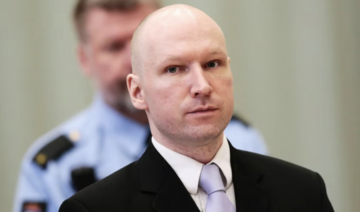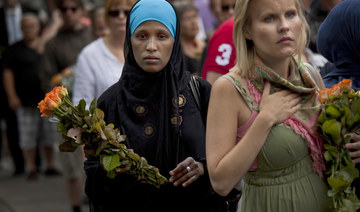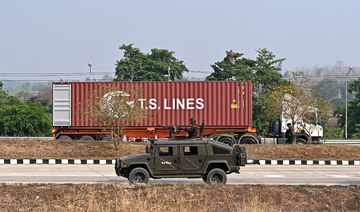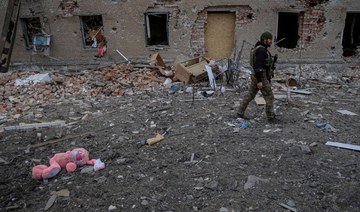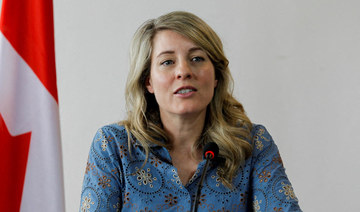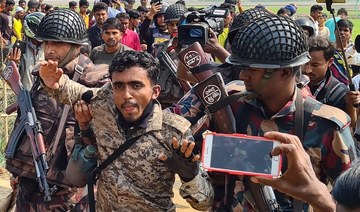OSLO: A tearful Anders Behring Breivik, the right-wing extremist who killed 77 people in 2011, on Tuesday accused Norway of trying to “push (him) to suicide” with strict prison conditions, while authorities insisted he remained extremely violent.
“I have the impression that the government’s aim is to try to push me to suicide,” Breivik said on the second day of a court hearing in the lawsuit he has brought against the Norwegian state over his prison conditions.
“They are close to succeeding. I don’t think I will manage to survive much longer without human relations,” the 44-year-old told the court, convened for security reasons in the gymnasium of Ringerike prison where he is serving his sentence.
Held apart from other inmates in high-security facilities for almost 12 years, Breivik claims his extended isolation is a violation of Article 3 of the European Convention on Human Rights, which prohibits “inhuman” and “degrading” treatment.
The lawyer representing the state, Andreas Hjetland, defended Breivik’s conditions — which are strict but comfortable — as warranted since he still poses “an absolutely extreme risk of totally unbridled violence.”
On July 22, 2011, Breivik set off a bomb near government offices in Oslo, killing eight people, before gunning down 69 others, mostly teens, at a Labour Party youth wing summer camp on the island of Utoya.
He was sentenced in 2012 to 21 years in prison, which can be extended as long as he is considered a threat.
At one point during his testimony on Tuesday, Breivik, who takes anti-depressants, broke down in sobs.
“I understand that... revenge is important and that a lot of people hate me. But I’m still a human being,” he said.
He claimed he had distanced himself from his crimes — which he attributed to his “vulnerability” to radicalization — and said he thought of suicide “every day.”
Breivik has apologized in the past and showed no remorse on other occasions.
His testimony left families of the victims unmoved.
“He cries when he feels sorry for himself but when he says he’s sorry for what he did, he’s cold and cynical. I don’t believe him for a second,” Lisbeth Kristine Royneland, the head of a support group for families of the victims and who lost her 18-year-old daughter on Utoya, told AFP.
During Tuesday’s proceedings it emerged that Breivik tried to kill himself in 2020 by hanging himself with a towel, but made sure to inform prison guards first, the state’s lawyers noted.
In 2018, he also launched a disobedience campaign, drawing symbols such as swastikas with his feces, shouting “Sieg Heil” and undertaking a hunger strike.
“Breivik represents the same danger today as on July 21, 2011,” the eve of the twin attacks he prepared meticulously for years, Hjetland said.
He cited assessments by psychiatrists and prison wardens which suggest that Breivik remains dangerous and still believes his attacks were justified.
Asked once how he felt about having killed children on Utoya, he responded that in extreme-right circles the belief is that “if you’re old enough to be politically active, you’re old enough to be the target of terrorism.”
At the Ringerike prison, located on the shores of the lake that surrounds the island of Utoya, Breivik has access to several rooms including a kitchen, a TV room with a game console, and an exercise room.
Prison officials have also complied with his request for a pet by providing him with three budgies.
But Breivik’s lawyer Oystein Storrvik insists Norwegian authorities have not put sufficient measures in place to compensate for his relative isolation.
His human interactions are mostly limited to contacts with professionals such as wardens, lawyers and a chaplain.
“There is still no indication suggesting any (psychological) suffering linked to his isolation or that he is suicidal,” argued another lawyer for the state, Kristoffer Nerland.
Breivik enjoys “a wide range of activities,” he said, including cooking, video games, walks, basketball and studies.
Citing another article of the Convention on Human Rights that guarantees the right to correspondence, Breivik has also asked for an easing of his mail restrictions.
In 2016, Breivik sued the Norwegian state on the same grounds, with a lower court ruling in his favor before higher courts found in the state’s favor.
In 2018, the European Court of Human Rights dismissed his case as “inadmissible.”
Norway trying to ‘push me to suicide’, says sobbing Breivik
https://arab.news/nu9jg
Norway trying to ‘push me to suicide’, says sobbing Breivik
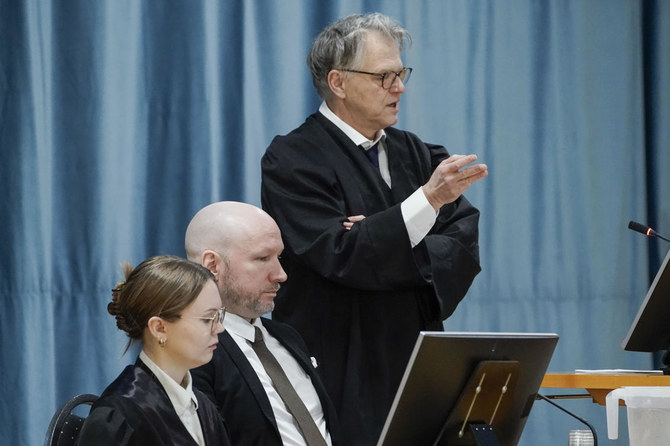
- “I have the impression that the government’s aim is to try to push me to suicide,” Breivik said on the second day of a court hearing
- “I don’t think I will manage to survive much longer without human relations,” said the 44-year-old
Myanmar junta bans men from applying to work abroad

- Ruling junta's plan to call up all men to serve in the military for at least two years has sent thousands queuing for visas outside foreign embassies in Yangon
YANGON: Myanmar’s junta has suspended the issuing of permits for men to work abroad, it said, weeks after introducing a military conscription law that led to thousands trying to leave the country.
The junta, which is struggling to crush widespread armed opposition to its rule, in February said it would enforce a law allowing it to call up all men to serve in the military for at least two years.
The move sent thousands queuing for visas outside foreign embassies in Yangon and others crossing into neighboring Thailand to escape the law, according to media reports.
The labor ministry has “temporarily suspended” accepting applications from men who wish to work abroad, the ministry said in a statement posted by the junta’s information team late Thursday.
The measure was needed to “take more time to verify departure processes and according to other issues,” it said, without giving details.
More than 4 million Myanmar nationals were working abroad in 2020, according to an estimate by the International Labour Organization citing figures from the then-government.
Analysts say many more work abroad off the books.
The military service law was authored by a previous junta in 2010 but was never brought into force.
It allows the military to summon all men aged 18-35 and women aged 18-27 to serve for at least two years.
That law also has a stipulation that, during a state of emergency, the terms of service can be extended up to five years and those ignoring a summons to serve can be jailed for the same period.
The Myanmar junta announced a state of emergency when it seized power in 2021, with the army recently extending it for a further six months.
A first batch of several thousand recruits has already begun training under the law, according to pro-military Telegram accounts.
A junta spokesman said the law was needed “because of the situation happening in our country,” as it battles both so-called People’s Defense Forces and more long-standing armed groups belonging to ethnic minorities.
Around 13 million people will be eligible to be called up, he said, though the military only has the capacity to train 50,000 a year.
More than 4,900 people have been killed in the military’s crackdown on dissent since its February 2021 coup and more than 26,000 others arrested, according to a local monitoring group.
Send us Patriots: Ukraine’s battered energy plants seek air defenses against Russian attacks

- Ukraine's foreign minister has said half of the country’s energy system has been damaged by Russian attacks
- Russian President Vladimir Putin has framed the attacks as retaliation for Ukrainian strikes on Russian oil refineries
KYIV, Ukraine: At a Ukrainian power plant repeatedly hit by Russian aerial attacks, equipment department chief Oleh has a one-word answer when asked what Ukraine’s battered energy industry needs most: “Patriot.”
Ukrainian energy workers are struggling to repair the damage from intensifying airstrikes aimed at pulverizing Ukraine’s energy grid, hobbling the economy and sapping the public’s morale. Staff worry they will lose the race to prepare for winter unless allies come up with air-defense systems like the US-made Patriots to stop Russian attacks inflicting more destruction on already damaged plants.
“Rockets hit fast. Fixing takes long,” Oleh said in limited but forceful English.
The US has sent Ukraine some Patriot missile systems, and said last week it would give more after entreaties from President Volodymyr Zelensky.
The Associated Press on Thursday visited a plant owned by DTEK, the country’s biggest private energy supplier, days after a cruise-missile attack left parts of it a mess of smashed glass, shattered bricks and twisted metal. The coal-fired plant is one of four DTEK power stations struck on the same day last week.
The AP was given access on the condition that the location of the facility, technical details of the damage and workers’ full names are not published due to security concerns.
During the visit, State Emergency Service workers in hard hats and harnesses clambered atop the twisted roof of a vast building, assessing the damage and occasionally dislodging chunks of debris with a thunderous clang.
Ukrainian Foreign Minister Dmytro Kuleba told Foreign Policy magazine that half of the country’s energy system has been damaged by Russian attacks.
DTEK says it has lost 80 percent of its electricity-generating capacity in almost 180 aerial attacks since the start of Russia’s full-scale invasion in 2022. It estimates that repairing all the damaged plants would take between six months and two years — even if there are no more strikes.
Shift supervisor Ruslan was on duty in the operations room when the air alarm sounded. He sent his crew to a basement shelter but remained at his post when the blast struck only meters (yards) away.
He rushed out to darkness, dust and fire. He said he wasn’t scared because “I knew what I needed to do” – make sure his team was OK and then try to help put out the flames.
Russia pummeled Ukraine’s energy infrastructure to devastating effect during the “blackout winter” of 2022-23. In March it launched a new wave of attacks, one of which completely destroyed the Trypilska power plant near Kyiv, one of the country’s biggest.
Russian President Vladimir Putin has framed the attacks as retaliation for Ukrainian strikes on Russian oil refineries.
Oleh said the Russians are “learning all the time” and adapting their tactics. Initially they targeted transformers that distribute power; now they aim for the power-generating equipment itself, with increasing accuracy. The Russians also are sending growing numbers of missiles and exploding drones to exhaust Ukraine’s air defenses, and striking the same targets repeatedly.
DTEK executive director Dmytro Sakharuk said in March that out of 10 units the company had repaired after earlier strikes, two-thirds had been hit again.
More Russian missiles have been getting through in recent months as Ukraine awaited new supplies from allies, including a $61 billion package from the US that was held up for months by wrangling in Congress. It was finally approved in April, but it could be weeks or months before all the new weapons and ammunition arrives.
Ukraine’s energy firms have all but exhausted their finances, equipment and spare parts fixing the damage Russia has already wrought. The country’s power plants urgently need specialist equipment that Ukraine can no longer make at sufficient speed and scale.
Some 51 DTEK employees have been wounded in attacks since 2022, and three have been killed. Staff say they keep working despite the danger because they know how crucial their work is.
Machine operator Dmytro, who was on shift during the recent attack and took shelter in the basement, said that when he emerged, “my soul was bleeding when I saw the scale of the destruction.”
He thought of the many people who had poured heart and soul into building the mammoth power plant.
“This was destroyed in a few seconds, in an instant,” he said.
Dmytro, who worked at Ukraine’s Zaporizhzhia nuclear power plant before it was seized by Russia, said he would continue to show up for work every day, “as long as I’m able.”
“It’s our duty toward the country,” he said
Biden says ‘order must prevail’ during campus protests over the war in Gaza

- “Dissent is essential for democracy. But dissent must never lead to disorder,” the president said at the White House
- The Democratic president broke days of silence on the protests with his remarks amid mounting criticism from Republicans
WASHINGTON: President Joe Biden on Thursday rejected calls from student protesters to change his approach to the war in Gaza while insisting that “order must prevail” as college campuses across the country face a wave of violence, outrage and fear.
“Dissent is essential for democracy,” Biden said at the White House. “But dissent must never lead to disorder.”
The Democratic president broke days of silence on the protests with his remarks, which followed mounting criticism from Republicans who have tried to turn scenes of unrest into a campaign cudgel. By focusing on a law-and-order message while defending the right to free speech, Biden is grasping for a middle ground on an intensely divisive issue in the middle of his reelection campaign.
He largely sidestepped protesters’ demands, which have included ending US support for Israeli military operations. Asked after his remarks whether the demonstrations would prompt him to consider changing course, Biden responded with a simple “no.”
Biden said that he did not want the National Guard to be deployed to campuses. Some Republicans have called for sending in troops, an idea with a fraught history. Four students were shot and killed at Kent State University by members of the Ohio National Guard during protests over the Vietnam War in 1970.
Tensions on college campuses have been building for days as demonstrators refuse to remove encampments and administrators turn to police to clear them by force, leading to clashes that have seized widespread attention.
Biden said he rejected efforts to use the situation to “score political points,” calling the situation a “moment for clarity.”
“There’s the right to protest, but not the right to cause chaos,” Biden said shortly before leaving the White House for a trip to North Carolina. “People have the right to get an education, the right to get a degree, the right to walk across campus safely without fear of being attacked.”
The White House also maintained its focus on combating antisemitism. Doug Emhoff, husband of Vice President Kamala Harris, spoke to Jewish students and Hillel leaders on Thursday to hear about their experience with threats and hate speech, according to a White House official.
Biden will make his own visit to a college campus on May 19 when he’s scheduled to deliver the commencement address at Morehouse University in Atlanta.
His last previous public comment on the demonstrations came more than a week ago, when he condemned “antisemitic protests” and “those who don’t understand what’s going on with the Palestinians.”
The White House, which has been peppered with questions by reporters, had gone only slightly further than the president. On Wednesday, press secretary Karine Jean-Pierre said that Biden was “monitoring the situation closely” and that some demonstrations had stepped over a line that separated free speech from unlawful behavior.
“Forcibly taking over a building,” such as what happened at Columbia University in New York, “is not peaceful,” she said. “It’s just not.”
Biden’s latest remarks weren’t well received in some corners of the Democratic Party.
“We need to prevent lawlessness in society. We need to have protections against hate speech,” said a social media post from Patrick Gaspard, president of the Center for American Progress and a former White House political director under President Barack Obama. “But we need to be able to hold space for active dissent and activism that is discomforting without blanket accusations of hate and violence against all activists.”
But Biden’s team has expressed confidence that his stance appeals to the widest array of voters. It also echoes his approach to nationwide unrest after the murder of George Floyd by a police officer four years ago, a politically volatile situation in the middle of his campaign against then-President Donald Trump.
“I want to make it absolutely clear rioting is not protesting, looting is not protesting,” Biden said then in remarks that his team turned into an advertisement. “It’s lawlessness, plain and simple, and those that do it should be prosecuted.”
Biden has never been much for protests of any kind. His career in elected office began as a county official when he was only 28 years old, and he’s always espoused the political importance of compromise.
As college campuses convulsed with anger over the Vietnam War in 1968, Biden was in law school at Syracuse University.
“I’m not big on flak jackets and tie-dyed shirts,” he said years later. “You know, that’s not me.″
The White House has also maintained its focus on combating antisemitism. Doug Emhoff, husband of Vice President Kamala Harris, spoke to Jewish students and Hillel leaders on Thursday to hear about their experience with threats and hate speech, according to a White House official.
Despite the administration’s criticism of violent college protests and Biden’s refusal to heed demands to cut off US support for Israel, Republicans blame Democrats for the disorder and have used it as a backdrop for press conferences.
“We need the president of the United States to speak to the issue and say this is wrong,” House Speaker Mike Johnson, a Louisiana Republican, said on Tuesday. “What’s happening on college campuses right now is wrong.”
Johnson visited Columbia University with other members of his caucus last week. House Republicans sparred verbally with protesters while speaking to the media at George Washington University in Washington, D.C., on Wednesday.
Trump, who is running for another term as president, also criticized Biden in an interview with Sean Hannity on Fox News.
“Biden has to do something,” he said. “Biden is supposed to be the voice of our country, and it’s certainly not much of a voice. It’s a voice that nobody’s heard.”
He repeated his criticisms on Wednesday during a campaign event in Waukesha, Wisconsin.
“The radical extremists and far-left agitators are terrorizing college campuses, as you possibly noticed,” Trump said. “And Biden’s nowhere to be found. He hasn’t said anything.”
Kate Berner, who served as deputy communications director for Biden’s campaign in 2020, said Republicans already had tried the same tactic during protests over Floyd’s murder.
“People rejected that,” she said. “They saw that it was just fearmongering. They saw that it wasn’t based in reality.”
Apart from condemning antisemitism, the White House has been reluctant to directly engage on the issue.
Jean-Pierre repeatedly deflected questions during a briefing on Monday.
Asked whether protesters should be disciplined by their schools, she said “universities and colleges make their own decisions” and “we’re not going to weigh in from here.”
Pressed on whether police should be called in, she said “that’s up to the colleges and universities.”
Asked on Thursday why Biden chose to speak on the matter after police had arrested protesters at the University of California, Los Angeles and at universities in New York City, Jean-Pierre stressed instead the importance of any protests being nonviolent.
“We’ve been very consistent here,” she said. “Americans have the right to peacefully protest as long as it’s within the law and violence is not protected.”
Students erect pro-Palestinian encampments across major Canadian universities

- “If public disruption is the only way to get our voice heard, then we are willing to do that,” says University of Toronto protest leader
- Some Jewish groups have accused protesters of being antisemitic, but organizers said some protesters are Jewish
TORONTO: Quebec Premier Francois Legault said on Thursday the encampment at Montreal’s McGill University should be dismantled as more students erected pro-Palestinian camps across some of Canada’s largest universities, demanding they divest from groups with ties to Israel.
The Canadian protests come as police have been arresting hundreds on US campuses and the death toll in Gaza has been mounting.
While McGill had requested police intervention, law enforcement had not stepped in Thursday to clear the encampment and said in a statement Thursday evening it was monitoring the situation.
Students also set up encampments at Canadian schools including the University of Toronto, the University of British Columbia and the University of Ottawa.
“We want the camp to be dismantled. We trust the police, let them do their job,” a spokesperson for Legault said.
There was also a pro-Israel counter-protest in Montreal Thursday. The two sides were kept separate.
On Thursday morning, students at the University of Toronto set up an encampment in a fenced-off grassy space at the school’s downtown campus where some 100 protesters gathered with dozens of tents.
According to a statement from organizers the encampment will stay until the university discloses its investments, divests from any that “sustain Israeli apartheid, occupation and illegal settlement of Palestine” and ends partnerships with some Israeli academic institutions.
Israel says it does not participate in apartheid and that its assault on Gaza does not constitute genocide.
A university spokesperson told Reuters it was “in dialogue with the protesters” and that, as of midday, the encampment was “not disruptive to normal university activities.”
University of Toronto graduate student and encampment spokesperson Sara Rasikh told Reuters they will remain until their demands are met.
“If public disruption is the only way to get our voice heard, then we are willing to do that,” she said.
Some Jewish groups have accused protesters of being antisemitic. Organizers deny that charge, noting that some protesters are Jewish.
Asked to comment on the encampments, Prime Minister Justin Trudeau’s office pointed to a statement he made on Tuesday, saying “Universities are places of learning, they’re places for freedom of expression ... but that only works if people feel safe on campus. Right now ... Jewish students do not feel safe. That’s not right.”
The protests follow the deadly Oct. 7 attack on southern Israel by Hamas militants from the Gaza Strip, which killed 1,200 people and saw dozens taken hostage, and an ensuing Israeli offensive that has killed about 34,000 and created a humanitarian crisis.
India deports Myanmar refugees who fled 2021 coup

- At least 38 refugees were deported on Thursday by the border state of Manipur
- ndia is not a signatory to the1951 UN Refugee Convention and has no law protecting refugees
GUWAHATI, India: India on Thursday deported the first group of Myanmar refugees who had sought shelter after a 2021 military coup, a top state minister said, following weeks of efforts that were hampered by fighting between Myanmar’s rebel forces and the ruling junta.
Thousands of civilians and hundreds of troops from Myanmar have crossed the border to India after the coup. This has worried New Delhi, which has announced plans to fence its border with Myanmar and end a visa-free movement policy.
At least 38 refugees were deported on Thursday by the border state of Manipur, which plans send back a total of 77 people as it copes with sporadic violence that has killed at least 220 people since ethnic clashes broke out in May last year.
“Without any discrimination, we have completed the first phase of deportation of illegal immigrants from Myanmar,” Manipur Chief Minister N. Biren Singh said in a social media post. “The state government is continuing the identification of illegal immigrants.”
One Indian national was also repatriated by Myanmar, Singh added.
New Delhi has not signed the 1951 UN Refugee Convention, which spells out refugee rights and states’ responsibilities to protect them, and it does not have its own laws protecting refugees.
Singh, who is from Prime Minister Narendra Modi’s Bharatiya Janata Party, said in March deportations had begun, but Indian security officials said the efforts were held up by fighting in Myanmar.
Modi is seeking a rare third straight term in ongoing national elections and his government has blamed the refugee influx as one reason for violence that has roiled Manipur.



